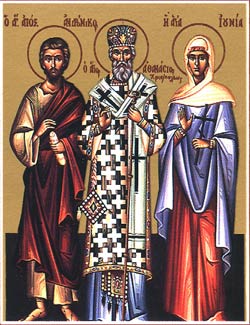Readings:
Isaiah 61:1‑4
Psalm 68:7‑11
Romans 16:7, 25‑27
John 17:6‑23
Preface of Apostles and Ordinations
[Common of a Pastor]
[For the Ministry]
[For the Unity of the Church]
PRAYER (traditional language):
Almighty God, whose Son, the risen Christ, sent forth thine apostles Andronicus and Junia to proclaim
the Gospel and extend thy reign: Send us forth in thy Holy Spirit, that women and men may minister
as one in faithful witness to the Gospel of Jesus Christ; who liveth and reigneth with thee and the Holy
Spirit in perfect unity, one God, now and for ever.
Amen.
PRAYER (contemporary language):
Almighty God, whose Son, the risen Christ, sent forth your apostles Andronicus and Junia to proclaim
the Gospel and extend your reign: send us forth in your Holy Spirit, that women and men may minister
as one in faithful witness to the Gospel of Jesus Christ; who lives and reigns with you and the Holy
Spirit in perfect unity, one God, now and for ever.
Amen.
This Commemoration appears in A Great Cloud of Witnesses.
Return to Lectionary Home Page
Webmaster: Charles Wohlers
Last updated: 16 March 2019
JUNIA AND ANDRONICUS
 |
Andronicus, Athanasius of Christianopoulos, and Junia |
Junia (Greek: Ιουνια) was a 1st-century Christian, highly regarded and complimented by the apostle Paul. Paul probably refers to Junia as an apostle. The consensus among most modern New Testament scholars is that Junia was a woman.
The only reference to Junia and Andronicus appears in Romans 16:7 (NRSV):
"Greet Andronicus and Junia, my relatives who were in prison with me; they are prominent among the apostles, and they were in Christ before I was."
Eastern Orthodox traditions say Junia and Andronicus of Pannonia traveled extensively and preached the Gospel to pagans, many of whom were converted to Christianity. Many of the pagan temples were closed, and in their place Christian churches were built. Junia and Andronicus are believed to have suffered martyrdom for Christ. The female identity of Junia was accepted without objection during the first twelve centuries of the church, according to the writings of the church fathers.
— largely from Wikipedia